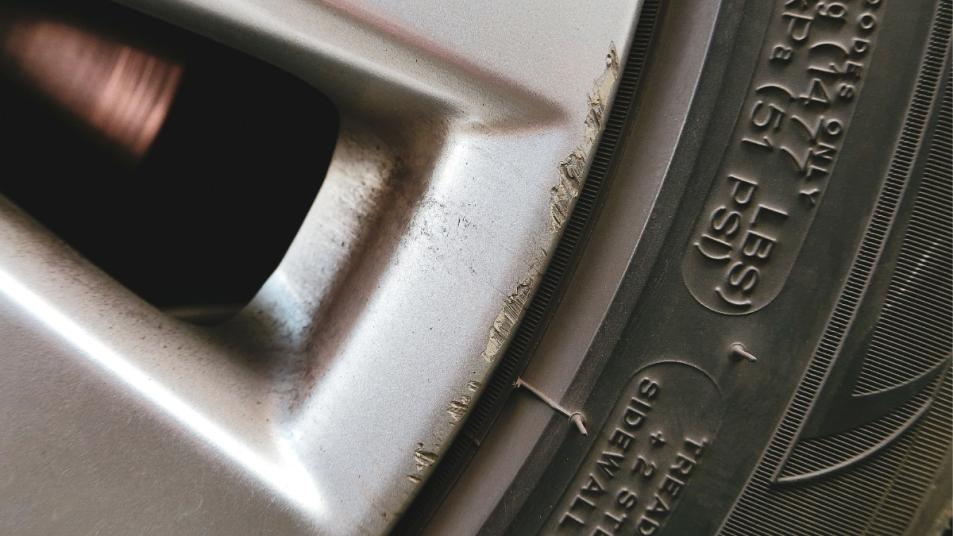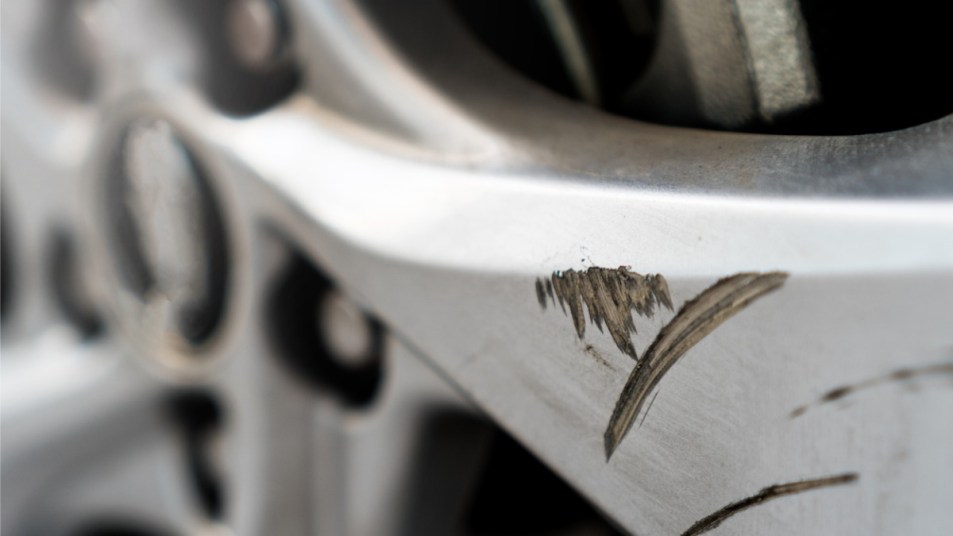Quick Facts About Curb Rash
- When selling a car, repairing curb rash will often increase a car’s perceived value.
- If you are trading in the car, repairing curb rash may not increase value.
- Curb rash damage could be a sign of bigger problems.
Whether you are selling your car by owner to another individual (peer-to-peer), selling it to a dealer (direct-to-dealer), or trading it in, putting in the time and effort to make it look its best makes sense. That’s because it instills in the buyer’s mind that the vehicle has been well cared for and will help you get top dollar. Consequently, you’ll want to thoroughly clean it inside and out, fix any chips or scratches on the exterior paint, and so forth.
However, curb rash on the wheels is one tougher-to-fix exterior blemish that may reduce a car’s value in a buyer’s eyes. Here, we’ll jump into curb rash: explaining what it is, if you should fix it, how to fix it, and how to avoid it. You can use the jump links below to skip ahead.
- What Is Curb Rash?
- What Causes Curb Rash?
- Should You Fix Curb Rash?
- When Not to Fix Curb Rash?
- What Bigger Issues Might Curb Rash Indicate?
- How to Repair Curb Rash Damage
- How to Avoid Curb Rash Damage
What Is Curb Rash?
Curb rash is when your car’s wheels scrape against a curb or other hard, solid object, causing scratches and divots. It usually results from your vehicle scraping a curb when parking, landing in a pothole, or simply drifting against a curb when driving. Consequently, such damage is more common than you might think. Wheels damaged by curb rash are sometimes called “curbed wheels.”
What Causes Curb Rash?
Driver error is the most common cause of curb rash. In other words, such wheel damage is often the result of an inattentive or careless driver running a wheel against a curb. It usually occurs when parallel parking, using a drive-thru window, or allowing the car to wander out of its lane.
Should You Fix Curb Rash?
Yes, because any reasonable step you can take to increase the overall value of the vehicle you are attempting to sell is financially savvy. Here’s why:
- Increase perceived value — Just about anything you do to improve your car’s looks before selling it is to boost its value in the eyes of any potential buyer. That includes everything from eliminating chips in the paint to spritzing some air freshener around the interior. Cleaning up any wheel curb rash will also enhance the perceived value.
- Surprisingly affordable — You can probably eliminate light chips and scratches by sanding with fine-grain sandpaper and then applying a good polish. A professional will better handle more severe cases of curb rash. However, even taking the damaged wheel to a shop specializing in curb rash will likely cost less than $200 to get a typical alloy wheel looking like new. On the other hand, wheels with chrome or a painted finish will cost at least twice that much or more.
TIP: As with any repair, getting more than one estimate can be worth the trouble.
When Not to Fix Curb Rash
Every rule usually has exceptions, including our advice to fix curb rash. Here are a few reasons to skip fixing a curbed wheel:
- Low-value car — Finding the value of your car before listing it for sale should be your first step when selling a car. If you discover its value is low (for example, less than $8,000), fixing curb rash may not be worth it.
- Inexpensive wheel — Considering the range of costs for wheel repair, it’s possible you can replace the wheel for a cost similar to or lower than fixing it. This is particularly true for smaller wheels and entry-level wheels.
- Expensive wheel — The fancier and more intricate a wheel, the more it will probably cost to repair. It’s still worth taking to a wheel shop for an estimate because the fix could be affordable. However, the repair cost could also be wildly expensive. You’ll need to weigh the cost against the possible value gain.
- Trading in the car — If you plan to trade in the car, repairing the wheel may have little impact on the value. Be assured the dealer has a wheel shop on speed dial that will complete the repair at a bargain price.
What Bigger Issues Might Curb Rash Indicate?
Depending on the severity of the impact, curb rash could be a sign of a larger issue. Check out these more significant problems for which the visible wheel damage brings more cost:
- Wheels out of alignment
- Damage to brake lines
- Tire damage, such as weakened side walls
- Compromised wheel structure
How to Repair Curb Rash Damage
We recommend taking your vehicle to a professional for any curb rash damage beyond very light scratches and chips. The cost may be less than you think, and the finished product will look new. If the repair seems doable, here are some hints for do-it-yourselfers.
Curb Rash Wheel Repair Supplies
Here are some of the supplies you may need for DIY curb rash repair:
- Floor jack
- Jack stands
- Socket wrench or tire iron
- Torque wrench
- All-purpose cleaner
- Soft-bristle nylon brush
- Isopropyl alcohol
- Microfiber towels
- Masking tape
- Dremel tool
- Sandpaper of various grits
- Primer
- Paint
- Clearcoat
How to Fix Curb Rash Damage
We’ve put together some steps for repairing curb rash. This is just a jumping-off point. The curb rash damage you encounter may have different repair requirements. Consequently, these steps are an example intended to represent the scope of the task.
- Remove the wheel from the car.
- Thoroughly wash the wheel and tire.
- Use sandpaper or a Dremel tool to remove high spots from the damaged area.
- Sand the damaged area and surrounding metal multiple times and use a higher-grit sandpaper during each step to blend the damage.
- Tape off the tire and apply polyester putty, like Bondo, to the curb rash.
- Use fine-grit sandpaper to smooth and remove excess Bondo from the wheel.
- Rewash the wheel and wipe it down with isopropyl alcohol or a paint preparation product.
- Apply a light coat of primer to the damaged area or the entire wheel, depending on the severity.
- After the primer is dry, apply a second coat to ensure consistent coverage.
- Sand the primer smooth using fine-grit sandpaper.
- Apply a light layer of paint to the wheel.
- After the paint dries, apply additional coats until you achieve the desired finish.
- Apply a light layer of clearcoat to the wheel.
- After the clearcoat dries, apply additional coats to ensure consistent coverage and increase durability.
How to Avoid Curb Rash Damage
Because curb rash is most often a result of scraping against or bouncing off a curb, the only way to avoid it is to drive more alert and stay aware. If you can’t parallel park without hitting the curb, always use perpendicular parking spaces. Or, you might consider acquiring and installing an aftermarket backup camera. When driving, keep to the center of the lane. In most cases, curb damage is easily avoided.
Editor’s Note: This article has been updated for accuracy since it was originally published.











